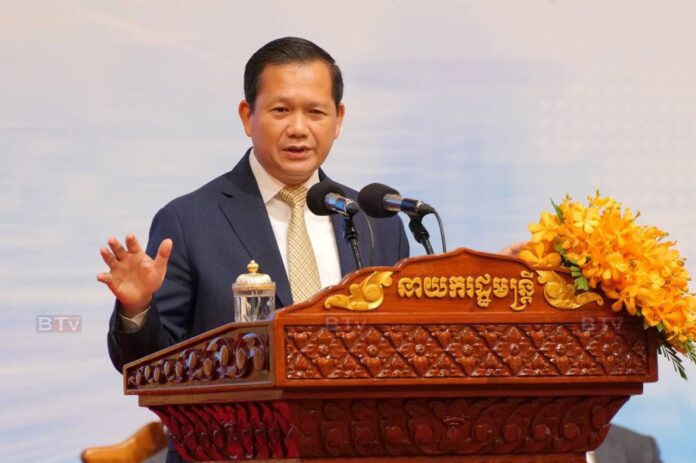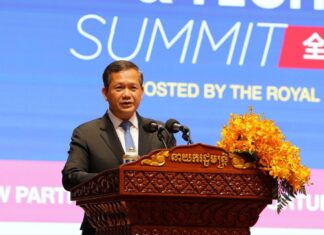- His Excellency Mr. Sonexay Siphandone, Prime Minister of the Lao People’s Democratic Republic;
- His Excellency Mr. Pham Minh Chinh, Prime Minister of Socialist Republic of Vietnam;
- Mr. Oudet Souvannavong, President of Lao National Chamber of Commerce and Industry and Chairman of the ASEAN Business Advisory Council 2024;
- Excellencies, Ladies, Gentlemen;
Today, I am very pleased to join this Networking Breakfast Session alongside the Prime Ministers of Lao PDR and the Socialist Republic of Vietnam. First and foremost, I would like to express appreciation to the ASEAN Business Advisory Council for the continued diligent efforts in organizing the ASEAN Business and Investment Summit (ABIS).
This Summit has proved to be an effective platform that brings ASEAN Leaders, private sectors, and other stakeholders together to share knowledge and wisdom on how to foster growth, deepen integration and accelerate sustainable development.
Excellencies, ladies, and gentlemen,
Although I wish to start with a positive note, unfortunately, the global economic environment does not provide us a comfort zone to rely on. We have witnessed attempts to disconnect, de-risk and de-globalize backed by increased trends of protectionism and unilateralism, causing dim prospect for global economic recovery. Threats of violent conflicts and other non-traditional securities are not out of sight.
Facing such volatile environment, I believe that international and regional investors alike still view ASEAN as a light of hope and a driving force to lead global growth thanks to its overall peace, stability and most important of all its friendly relations with all major powers. ASEAN has made it clear that it has no intention to take side, and for that reason, all super- and major powers, despite their growing differences, still rely on ASEAN platform to bridge gap within multilateralism, including efforts to maintain growth and sustainable development.
Within ASEAN, Cambodia, Laos and Vietnam are considered as newcomers but we are not late-comers. Many investors are looking at us as shining spot amid global uncertainties thanks to the proven consistent growth. Sitting right in the middle of ASEAN, this region stands to benefit from geographically strategic dividends, viewing from the perspective of regional production and supply chain that should be resilient and diversified.
While I am sure that my colleagues have elaborate on their respective country’s prospects, let me show you what Cambodia has to offer.
Excellencies, Ladies and Gentlemen!
Over the last decade, Cambodia has consistently been among the top least developed country (LDC) recipients of FDI. The kingdom’s inclusion in the Financial Times’ FDI Intelligence Standouts Watchlist 2024, ranking among the world’s top 50 FDI destinations, further solidifies its attractiveness to global investors. Number speaks for itself.
From September 2023 to September 2024, Cambodia’s FDI inflow amounted to USD 7.5 billion which marked an increase of USD 4.7 billion or 161% compared to the same period between 2022 and 2023. This signifies a strong confidence by investors in Cambodia’s economy to withstand pressures and challenges caused by external megatrends that continue to hamper global economic landscape in recent years and in the near future.
Beyond benefits derived from regional agreements within ASEAN, Cambodia has strived to further expand and diversify our market and export opportunities. In 2020 and 2022, Cambodia signed bilateral FTA with China and Republic of Korea, respectively. These bilateral FTAs have leveraged further the level of liberalization and other commitments that participating countries have committed under the ASEAN-China, ASEAN-ROK and RCEP, and therefore providing a much larger opportunities to benefit from. In 2023, Cambodia also signed with the United Arab Emirates (UAE) a Comprehensive Economic Partnership Agreement that opened up a new gateway for Cambodian products towards the middle-east region.
It is worth to note that, beside the benefits from the afore-mentioned agreements, Cambodia is still a benefactor from a wider duty-free, quota-free preferential market access for Least Developed Countries (LDC) under the WTO framework, which includes the General System of Preferences (GSP) schemes that provides at least 97% duty-free market access namely through the EU’s Everything But Arms (EBA), the UK’s Developing Countries Trading Scheme, and other GSP schemes from China, Australia, New Zealand, Japan, Switzerland, and Canada, just to name a few.
Cambodia’s robust economic performance is a testament to the strength of our economic fundamentals—such as a strategic location at the heart of the region and a large pool of young, vibrant and skillful workforce—as well as the effectiveness of our policies. The Royal Government upholds at all time its pro-business approach by providing support and assistance to the private sector at all stages of their business operations. We have implemented comprehensive laws, policies and strategies to enhance the business landscape and invested heavily in key infrastructure, access to regional markets, decent job, social protection, digitalization, and sustainable environment.
Cambodia is one of the most liberalized economies in the world. Foreign investors can set up their investment projects with 100% foreign ownership in most sectors without local participation requirements. The only exception is land ownership. In fact, Cambodia was among the first countries in the region to open almost all sectors to foreign investment since 1994. Foreign investors can repatriate their profits freely to their home country. On top of that, through the new Law on Investment, Cambodia offers generous and sophisticated investment incentive schemes, together with improved facilitation service, by simplifying registration procedures and providing a wide range of aftercare services to investors.
This year, the Royal Government has also introduced the “Special Program to Promote Investment in Preah Sihanouk Province 2024”, offering procedural facilitation and Special Benefits to investors beyond the Law on Investment. I also instructed relevant authorities to formulate a special programme to incentivize investment in the four Northeastern provinces, bordering with Laos and Vietnam. The special programme is expected to include public infrastructure development projects and generous incentives to boost further investment confidence in the region that has been relatively less connected and less developed. I need to mention also about the recently launched Comprehensive Master Plan on the Cambodian Transit and Logistics System 2023-2033, which includes 174 projects over the next 10 years, with an estimated total investment value of USD 36.68 billion. This Master Plan presents exceptional and boundless opportunities for regional and international investors alike, especially when viewing from the perspective of public-private partnership (PPP).
I wish to underline that Cambodia always adhere to the business modus operandi that is non-discriminative and on a “first-come, first served” basis regardless of investment origins so long as they have goodwill in building mutually beneficial relations, supporting Cambodia’s growth and sustainable development.
We have exercised an engaging and supportive approach by not only diligently listening to the challenges raised by investors on a regular basis, but also forging tireless ties with the private sector to solve evolving issues effectively and efficiently by adhering to the principle of “think together, act together, and take joint responsibility”. In this spirit, the Royal Government has regularly developed and implemented several mechanisms to provide the most convenient channel for the private sector to express their comments, concerns, and suggestions. The most prominent mechanism is the Government-Private Sector Forum (G-PSF), which I presided over at its 19th Forum in November last year, adopting 11 packages of concrete measures that have been implemented truthfully by relevant authorities.
Excellencies, Ladies and Gentlemen!
In closing, I wish to underscore the significance of ASEAN in Cambodia’s integration to the region and the world. We have benefited greatly from this regional grouping, that has shaped and solidified Cambodia’s utmost commitment to inclusive multilateralism. As we look forward to the future, the road to sustainable prosperity requires steadfast commitment in pursuing deeper integration to build a resilient, innovative, dynamic, inclusive, people-centered, and future-proof ASEAN Economic Community against emerging challenges in the region and beyond. I am confident that by fully harnessing the immense potential of this region, we will elevate ASEAN to even greater heights.
Finally, I wish to end my speech by expressing Cambodia’s earnest welcome to all investors to the Kingdom and may I wish the ABIS 2024 a great success, and to all Excellencies, Ladies, and Gentlemen, the four Buddha blessings of longevity, nobility, health, and strength.
Thank you.






![Special Lecture by Samdech Akka Moha Sena Padei Techo HUN SEN, President of the Senate of the Kingdom of Cambodia, on “Leadership Experiences and Vision for Peace” to the 11th Plenary of the International Parliament for Tolerance and Peace (IPTP) [Unofficial Translations]](https://pressocm.gov.kh/wp-content/uploads/2024/12/468161445_1188047276010391_3141496335218348185_n-100x70.jpg)
